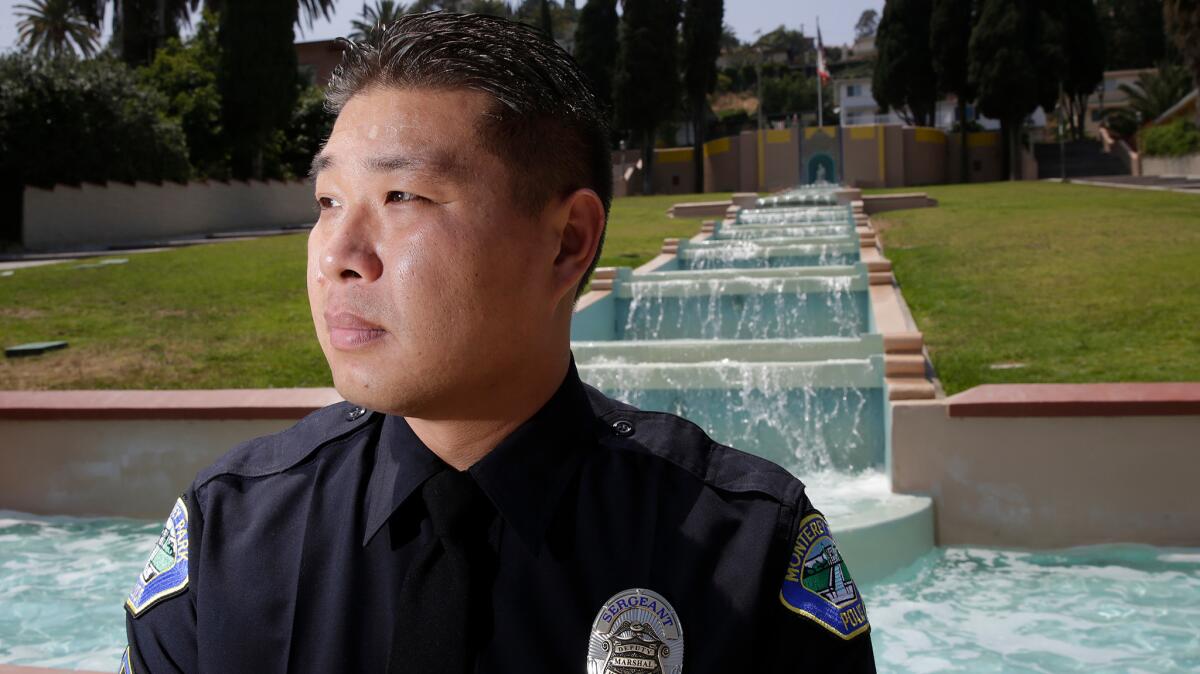Here’s one reason there’s only one Chinese cop patrolling Monterey Park: Chinese mothers

- Share via
The old Chinese men stamp out their cigarettes, hide their dice and scoot their chairs from the street to the park’s sidewalk.
Bob Hung pulls his police cruiser to a stop and rolls down his window.
“Ni hao. Mei shi ba?” he asks them. How’s it going?
The men insist that they weren’t smoking or gambling. One man, Yu Chang, says that he quit after Hung wrote him a $400 ticket a few years ago, and they laugh.
“Your wife must be thanking me,” Bob tells him in Chinese. He encourages Chang to drink more tea before he drives away.
Hung is the only Chinese-speaking police officer on patrol in Monterey Park, a city that is nearly 50% Chinese, according to the latest census figures.
Chinese-speaking officers are rare in the San Gabriel Valley in part because recruiters looking for Chinese applicants run into a formidable cultural obstacle, says Monterey Park Police Chief Jim Smith: Chinese mothers.
“It’s a stereotype, but you have parents who want their children to be doctors, attorneys and accountants — pretty much anything but a police officer,” Smith said.
To become a police officer, Hung first had to convince his mother.
It’s a stereotype, but you have parents who want their children to be doctors, attorneys and accountants — pretty much anything but a police officer
— Monterey Park Police Chief Jim Smith
A week before he entered the police academy, Hung sat at the dinner table of his parent’s Hacienda Heights home and waited, without much hope, for congratulations.
He had just told his parents that he planned to be a police officer, and he’d shaved his head to show he was serious.
His sister, a UC Berkeley graduate, and brother, a bank vice president, praised him for finding a career. His father, Albert, was more pragmatic than proud, and asked what would happen after the police academy. There were no congratulations from his mother, Sue Mei.
“How quickly can you grow it back?” she asked, referring to his hair.
In Taiwan, the only people who shaved their heads were prisoners and soldiers. In Chinese movies, the cops seemed to either get shot or corrupted by greed. Where Sue Mei grew up, police were mostly known for causing trouble and writing tickets.
Soldier, prisoner, or police — none of these were careers she had imagined for her youngest son when the family came to the U.S. in 1983.
The Hungs settled in Monterey Park, where Albert sold flowers at swap meets and Sue Mei did the arrangements. After they started a business and began attending trade shows, they would bring Hung along to translate.
Hung, Sue Mei said, was an energetic, mischievous kid. He would charm wholesale flower buyers one minute and hurl firecrackers into the neighbors’ yards the next. He never did his homework and he stayed out too late, playing arcade games in billiard halls late into the evening, catching scoldings and smacks when he came home smelling of smoke.
She knew he’d never be a doctor — she once caught him changing the C’s on his report card to B’s — but they had high hopes for a future for him as a businessman or entrepreneur.
Hung wanted to make his mother happy. He tried to fulfill what he called the Asian American son’s “manifest destiny” — that is, a prestigious college degree and a high-paying job in finance, law, medicine or science.
He studied hard in high school and was accepted to UC Irvine, where he took up economics and international relations. He interned at UBS Paine Webber during college, and worked at a home mortgage start-up upon graduating.
See more of our top stories on Facebook >> »
But he didn’t believe in what he was doing, he says. He quit and started his own business teaching martial arts. He coached the lion dance troupe at the San Gabriel Valley Chinese Cultural Assn. in his spare time, where he met Jones Moy, who was then police chief of Monterey Park.
Moy, impressed by Hung’s confidence and command of the troupe, called Hung every time a position opened up. Hung went on a few ride-alongs and decided to try out for the academy.
He graduated second in his class of about 40. During the final interview for the officer position in Monterey Park, someone asked Hung why he wanted to be a cop.
He thought back to a stabbing that took place near the home on De La Fuente Street where he grew up, remembering his parents’ fear when police officers knocked on the door, and how his mother, dominant and fearless as a parent, seemed to shrink when the police spoke to her.
He thought about the tattoo on his back. It was inspired by a story his mother told him about an ancient Chinese general, Yue Fei, whose mother tattooed four words of encouragement on the general’s back before he went into battle. Hung’s mother had suggested two words for her son’s tattoo: zhong yi — righteousness and loyalty.
His answer was simple, Hung said. He wanted to help people like his parents.
Hung parked his police cruiser at the end of a long shift, took out his phone, and called his mother.
It was Easter Sunday in 2011, and he had been a Monterey Park police officer for a year. His mother was still getting used to the idea of her son as a cop — she still dropped lunches off for him at the station — and the constant contact helped calm her. He called at the beginning and end of every shift.
I’m OK, he told her. I’ll be home soon.
A few minutes after he hung up, his radio crackled.
Man down, roll medics. Shots fired, shots fired, officer down.
Hung stepped on the gas, trying not to think about how the reserve officer’s voice trembled over the radio. He arrived at the crime scene to find a police officer on the ground covered in blood. Hung jumped out and started running down Garfield Avenue where Edgar Battad, a 44-year-old man, was striding down the street with a .44 magnum in his hand.
Battad had already stabbed a man and shot a police officer that day. He turned around and fired the magnum at the two officers pursuing him. They returned fire. Across the street, Hung raised his service weapon for the first time and squeezed the trigger.
Hung’s mother woke up to a call from her son’s wife, Fay. Bob was involved in a shootout and a man was killed, Fay said. He’s OK, but his boss was shot.
Sue Mei hung up and thought: This job is too hard on a mother.
Every week, Hung takes his parents out for a meal and a recurring conversation about what his next career should be.
At New Capital Seafood in Rowland Heights, Sue Mei asks him when he plans to grow his hair back.
Hung’s eyes swivel skyward.
He knows his parents are proud of him, but he can’t help but notice that his siblings don’t get the same questions about their careers.
He’s proud of the police work he’s done over the last three years. His language skills help him elicit confessions, locate murder weapons and translate suicide notes, speeding investigations and providing cultural context to unexplained crimes.
Because there are so few Chinese-speaking officers, he’s often loaned out to other agencies. Immigration authorities, the FBI, neighboring police and fire departments have grown to rely on him.
He rarely tells his parents about the cases he’s working on. They learn the details the next day in the Chinese newspaper, and sometimes they ask him about it.
He tries to be patient and explain the good he can do in his position. He wants his parents to know that’s why he became a police officer, that he sees fearful Chinese mothers everywhere on his beat. Being a cop has given him a front-row seat to the harm that language and cultural barriers can cause, Hung says.
He told his parents about a Chinese birth tourist whose baby died as she drove from Corona to her doctor in Monterey Park, not knowing that closer emergency rooms could deliver her baby if she asked.
He shared his reluctance at issuing jaywalking citations to the elderly Chinese women crossing Atlantic Boulevard, knowing what a burden it would be for an immigrant Chinese family. After a speeding car killed one of them, he wrote reams of tickets with a clear conscience.
He helped pull an elderly Chinese woman from a burning building, persuaded her to go to the hospital and called the woman’s daughter so they could see each other before she died.
The conversations have convinced his parents to view police officers more favorably. The talks have also nudged them toward understanding another foreign concept.
“Kids should do what their parents tell them to, but parents must also listen to their children,” Sue Mei says.
In America, Albert adds, everyone walks their own path.
“Kids should do what their parents tell them to, but parents must also listen to their children.”
— Sue Mei Hung, Sgt. Bob Hung's mother
In April, Hung was promoted to sergeant, and Sue Mei bragged about his promotion to all of her friends. But she still fears for his safety.
So at the end of every shift, Hung parks his car and reaches for his phone to contact his mother. They’ve graduated from calls to texts.
“Mom, I’m home.”
ALSO
Sign up for Essential California
The most important California stories and recommendations in your inbox every morning.
You may occasionally receive promotional content from the Los Angeles Times.








